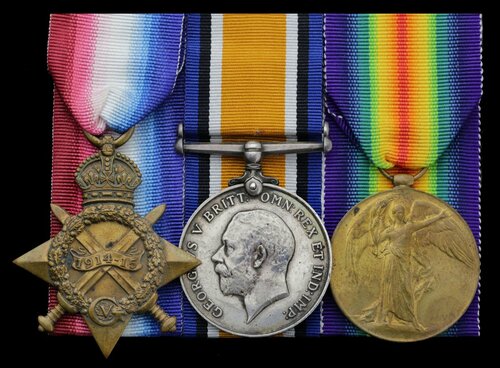
Auction: 21001 - Orders, Decorations and Medals (conducted behind closed doors)
Lot: 551
A most interesting campaign group of three awarded to Lieutenant B. M. Alexander, Royal Welsh Fusiliers who served beside Siegfried Sassoon on the Somme and was wounded by shell fire at the Battle of Passchendaele
1914-15 Star (2. Lieut. B. M. Alexander. R. W. Fus.); British War and Victory medals (Lieut. B. M. Alexander.), very fine (3)
Bertie Mavor Alexander was born in Worcester on 1 December 1890. His father was Henry Albert Alexander of the London Stock Exchange, who later worked as a Post Office Censor at Strand House. Bertie was schooled at Bowden House and Malvern, College. By 1911 he was working as an Insurance Clerk in London and living at 38 Queen's Road, Wimbledon.
On the outbreak of war in 1914 Alexander joined the 2nd Queens Westminster Rifles however he was soon commissioned into the 3rd (Reserve) Battalion, Royal Welsh Fusiliers on 20 April 1915. He served in France as Temporary Second Lieutenant from 1 October 1915 while 3rd (Reserve) Battalion was attached to 7 Division. He was confirmed in his rank on 7 December 1915. On 12 February 1916 he joined B Company, 1st Battalion on the front alongside Robert Graves and Siegfried Sassoon with whom he had served in the 3rd (Reserve) Battalion.
On the morning of 1 July 1916, the first day of the Battle of the Somme, the 1st Battalion, Royal Welsh Fusiliers took part in 7 Division's attack on the German lines at Fricourt. The Royal Welsh were attached to 22nd Brigade who were assigned to follow up upon the attack by 91st and 20th Brigades. These units would punch through the German lines to take the village of Memetz to the north-east of Fricourt, thereby cutting off this heavily defended position. These initial attacks were a success and the Royal Welsh were ordered to secure a stretch of high ground to the east of Fricourt. They adopted the unusual tactics of advancing from cover to cover, using shell holes and captured trenches as protection. The regiment also utilised bombing parties to great effect, advancing with these troops to the fore and allowing them to clear out opposition before following up with the bulk of their forces. The success of these tactics is apparent in the low casualties taken - just a few men dead and 35 wounded - and by the end of the war these tactics would have been widely adopted. The Battalion succeeded in consolidating the wavering British footholds in the Sunken Road Trench system leading towards Fricourt and began to fortify this position. Their War Diary shows that they repulsed several counter attacks at this time before being relieved by 14th Battalion, Royal Welsh Fusiliers on the 5 July.
At this time the British attack began to slow, although Fricourt was taken, the Battalion became entangled in a bloody battle around Memetz Wood. It is at this time that Sassoon's diary makes note of Alexander by name as one of the officers responsible for 'B' Company:
'Everyone very cheery - no officer casualties yet - C/O Morgan, Dobell, Perkins with 'A'. H B Williams, Alexander, Smith 'B' 'C' Self + Greaves [sic] + Lomax'
On 19 August 1916 Alexander was invalided from the front as a result of illness which later proved to be gonorrhoea (VD). Sexually transmitted diseases were not uncommon in the trenches, often caught at brothels behind the lines. He recuperated in France and re-joined the 1st Battalion on 3 December, however conditions at the front were poor and within a week he deteriorated and was forced to return to England.
It took Alexander over six months to recover, returning to the front in July 1917 for service with the 10th Battalion. His return coincided with the start of the Battle of Passchendaele in which 3 Division, to which the 10th Battalion was attached, was involved. On 26 September the Battle of Polygon Wood began with the 10th Battalion at fore of the offensive.
Alexander commanded 'D' Company during this battle, a role which placed him at the centre of the fighting. While taking cover in a shell crater he was struck by the blasts of two shells and was wounded, his medical report states:
'He states when in a shell hole he was blown up by 2 shell explosions and he was slightly wounded in the left shin but did not lose consciousness. He lost hearing of the left ear, he had twitching of chest muscles at first/ six days constant and then gradually lost this. He sleeps heavily but jumps about & dreams in sleep.'
The medical board found that Alexander was suffering from severe shell shock and was declared fit only for home service. After recuperating he joined the Graduate Battalion, 52nd Manchester Regiment as their Education Officer in April 1918. He served in this role both in England and later Germany.
With the end of hostilities Alexander applied for a Regular Commission but was unsuccessful. He entered Cambridge University and graduated with a BA in 1936, he became curate of Hale in North Guildford. He later became the Vicar of Christ Church, Shamley Green, Guildford where he served till retirement in 1964. During the Second World War he and his wife took on evacuees.
He was also famous for his occasionally ferocious sermons which occasionally made it into the newspapers. He described Shamley Green as "Shameless Green" and remarked "that is not a name to be proud of" (Hull Daily Mail 21 May 1949, refers). Alexander died on 12 June 1969 in Godalming; sold together with copied research and a portrait photograph taken in later life.
Subject to 20% VAT on Buyer’s Premium. For more information please view Terms and Conditions for Buyers.
Sold for
£600
Starting price
£240




